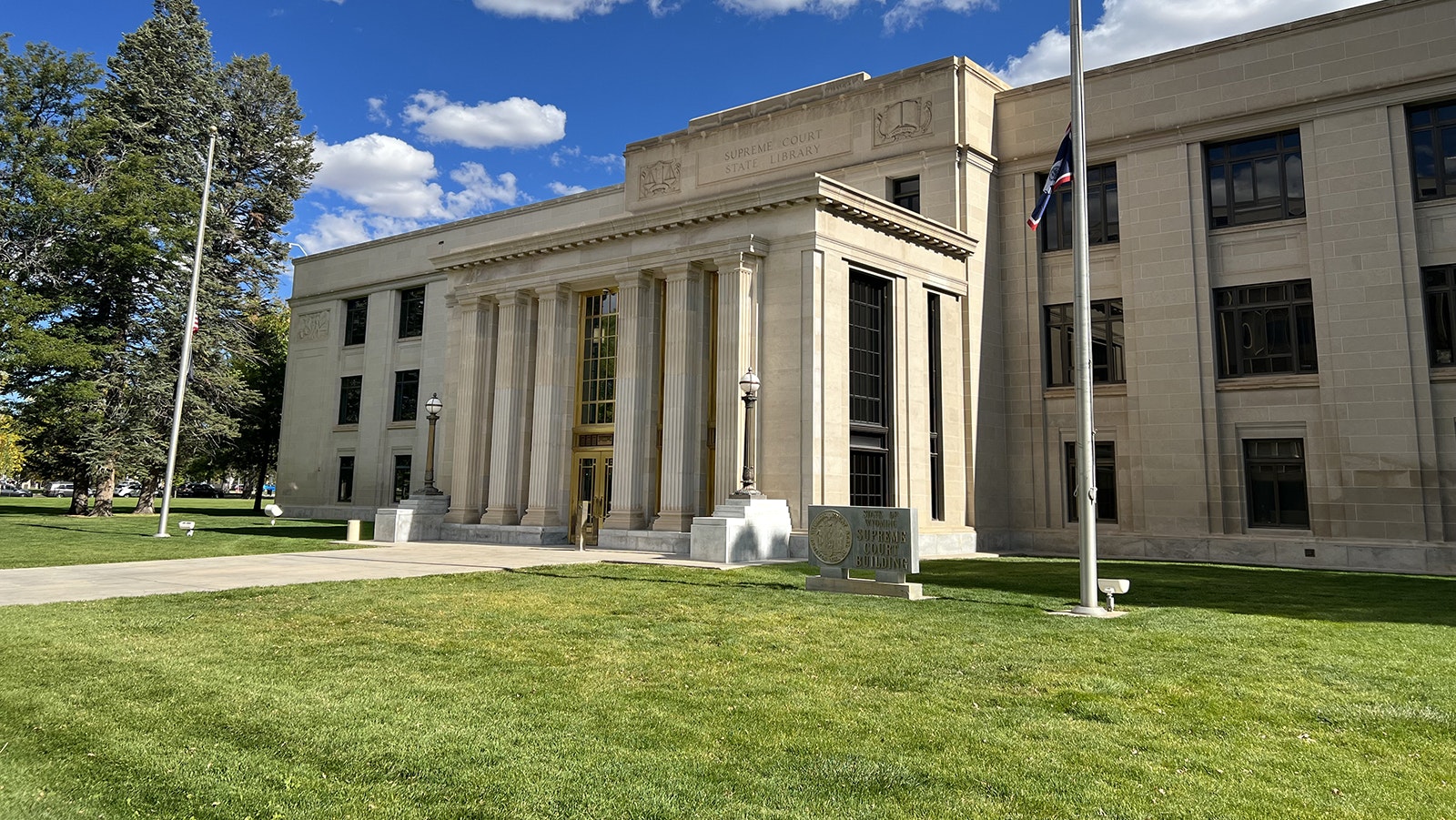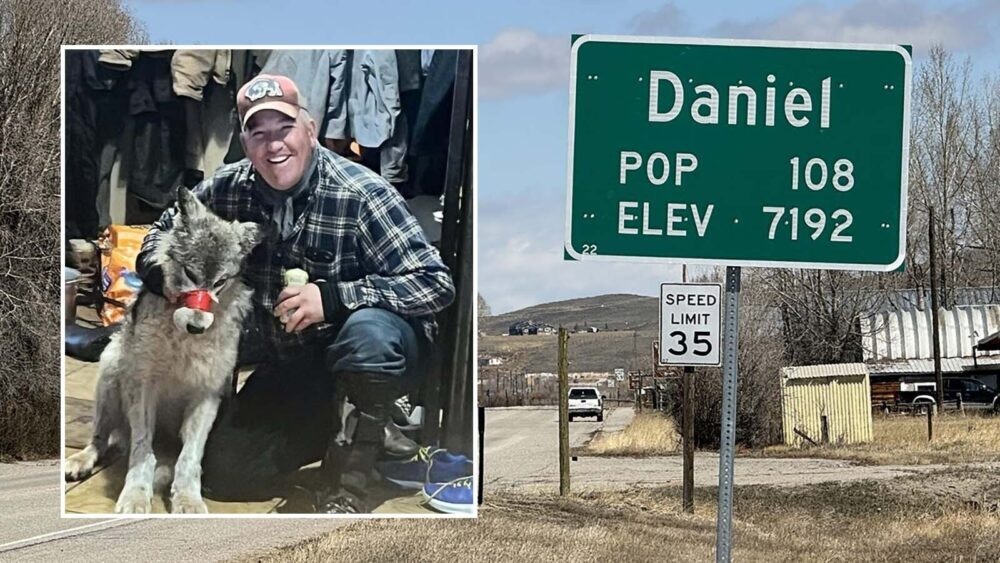A stepfather’s decision to adopt his wife’s young sons didn’t nullify a court order letting the boys’ grandparents stay in contact with them, the Wyoming Supreme Court has ruled.
Brett and Isabel Belden have a ranch near Thermopolis, Wyoming. Their son, Grant Belden, married Nicole Ward and the pair had two sons, in 2012 and 2015.
In 2016 when his youngest son was still a toddler, Grant died in a plane crash.
Ward and the children kept living near the Beldens for the next two years, according to a ruling the Wyoming Supreme Court published Thursday.
The boys called their grandparents “Gippy” and “Gimmy,” and would stay with them overnight, visit often and have family game nights, a guardian at litem wrote in an April 10 appeal brief to the Wyoming Supreme Court.
But Nicole Ward and Brett Belden had an argument over who was to possess two guns that Grant built. After that, Ward obtained a no-trespass order against Brett Belden, then she moved to Worland in 2019, says the filing.
A lot happened in Worland.
Ward limited, then denied, the grandparents opportunities to visit the boys.
“The visits are great for the boys, but hard on me,” Ward told Isabel Belden, according to the guardian ad litem filing.
Withdrawing
Ward reportedly cut off all ties with her prior friends and family in Thermopolis. Then she moved to Parkman, Wyoming, to live with her then-fiancé, Andy Ward.
Six months passed without Brett Belden seeing his grandchildren, and Ward told Isabel she “couldn’t see them anymore.”
So the grandparents filed a legal action in May 2019 in Washakie County District Court to win grandparent visitation rights, a provision Wyoming law allows.
Nearly a year later in March 2020, Ward, the Beldens and the guardian ad litem on the case agreed to an order establishing grandparent visitation with the children. It included monthly weekend-long visits in Thermopolis, visits in Sheridan and weekly phone calls between the children and the grandparents.
The parties met halfway to exchange the children. The order also prohibited the two couples from disparaging each other to the children.
Everyone followed that agreement for the next year and a half.
Because, COVID
In August 2021, Nicole married Andy Ward and soon afterward, the couple began limiting visitation with the Beldens. That November, the Wards gave “seemingly legitimate reasons” for withholding visitation, including COVID-19 exposure and poor weather, says the order.
“However, some of these excuses appear to have been contrived,” the order reads. “For example, when the Beldens were denied visitation because the children were allegedly quarantined for COVID-19, Ms. Ward took the children to the store, brought them on field trips with other children, and took them to the park to spend time with their maternal relatives.”
Ward did not reschedule the missed visits, the order says.
‘Actively Poisoned’
Andy Ward adopted the children Jan. 10, 2022. That same day, he sent a letter to the Beldens, saying the parents would no longer comply with the District Court Judge Bobbi Overfield’s grandparent visitation order. The letter did offer phone calls and three days of visitation per year.
“You can accept this offering and cooperate with us or get nothing and no visits,” the letter said, according to the order.
The Beldens fired back, filing a motion to compel Nicole Ward to come to court and answer for her apparent contempt of court by defying the judge’s order.
The judge joined Ward as a necessary party and held a bench trial, which is a trial where the judge is the decision-maker rather than a jury.
The Beldens testified that the Wards were actively undermining the children’s formerly healthy relationship with their parents, the order recounts.
The guardian ad litem was nowhere near that gentle, recounting from the judge’s later finding, “Mother and Father have ‘actively poisoned’ the children against Grandparents, which has likely led the children to be anxious and stressed about the visits as Mother and Father contend.”
The boys quit calling the grandparents “Gippy” and “Gimmy,” and resorted to using their names, says the order.
Also, Lobbying
The Wards, conversely, testified about the restaurant they’d bought and their efforts to homeschool the children. The boys were involved with their homeschool social groups, and the restaurant had a host of new demands that made the visitation agreement difficult to live up to.
The district court judge also conducted an in-camera interview with the older boy, says the order.
“He explained that his parents had told him that the Beldens had been cruel towards his deceased father, and that the Beldens were mean,” the order relates, adding “These comments and stories apparently had only been shared with him in the months leading up to trial.”
The district court judge determined the Wards either had coached the child ahead of trial or had failed to hide their “animosity for the Beldens” from the children.
Judge Overfield ruled that Andy Ward’s adoption of the boys didn’t nullify the grandparent visitation agreement.
The Wards appealed that order to the Wyoming Supreme Court in January.
Nicole Ward also appeared before a committee of the Wyoming Legislature and lobbied for a repeal of the grandparent visitation statute, but the Wyoming Senate rejected that request.
These Are The Issues
The high court had three issues to consider on appeal. Those are:
Whether Andy Ward’s adopting the boys nullified the grandparent visitation order.
Whether a district court should make the grandparents prove once again, following the parents’ request to change the order, that denying visitation would harm the child.
Whether the district court abused its discretion when it amended the grandparent visitation order, cutting the Beldens’ visitation schedule down to about half its earlier volume.
All three issues broke in the Beldens’ favor in the end.
Adoption
Had two people who were neither family members nor stepparents to the boys adopted them, it would have terminated the grandparents’ visitation rights, the high court ruled.
But when a stepparent or a family member adopts a child, the grandparent visitation rights survive that maneuver, the order adds, citing both case law and Wyoming statute.
No Abuse Of Rights Here
Ward had argued that his due process rights were violated when the judge didn’t make the Beldens prove anew, after his adoption, that their visitation was in the children’s best interest.
The Wyoming Supreme Court disagreed, saying Andy Ward couldn’t relitigate the whole case because his interests were so closely bound with Nicole Ward’s interests, and she represented them adequately during the initial grandparent visitation lawsuit.
Being so closely aligned with someone that they can speak for you in a court action is called “privity.” The high court ruled that the wards are “privies” with respect to one another’s interests in this action.
Also, the order adds, Ward knew about the visitation agreement when he adopted the boys.
Parental Rights
Grandparent rights actions involve a few different steps. First, the grandparents generally have to show that the parents’ rights would not be substantially impaired by granting visitation — and that either the parent is unfit, or denying visitation would harm the children.
Second, if the parents want the court to change the visitation order later on, the parents then have to show that good cause exists for that change.
Some courts do make grandparents prove the vital nature of their visits repeatedly.
But the majority of courts have reached the opposite conclusion, ruling that grandparents only have to prove that to obtain a visitation order, not every time it’s modified.
The majority rulings have been penned in the name of stability.
“(This) not only gives deference to a court’s order, but it also promotes the important policy goal of stability for the child,” says the high court’s ruling.
“We choose to follow the majority of courts,” it adds. “We decline to allow dissatisfied parents to relitigate the very foundation of visitation orders that have been determined to be in the child’s best interests.”
‘Persistent Animosity’
In modifying the order to accommodate the Wards’ busy new life, Judge Overfield cut the new visitation schedule down by half of the original and imposed travel arrangements and costs on the Beldens.
“It seems the Wards’ real complaint is that the district court did not adopt the more restrictive visitation schedule they had proposed,” says the ruling. “But a litigant’s mere dissatisfaction with an order does not establish an abuse of discretion.”
Lastly, the high court called Judge Overfield’s ultimate ruling thoughtful and calculated to reduce “the persistent animosity that the Wards have shown towards the Beldens.”
The high court upheld Overfield’s rulings in this case.
Clair McFarland can be reached at clair@cowboystatedaily.com.





